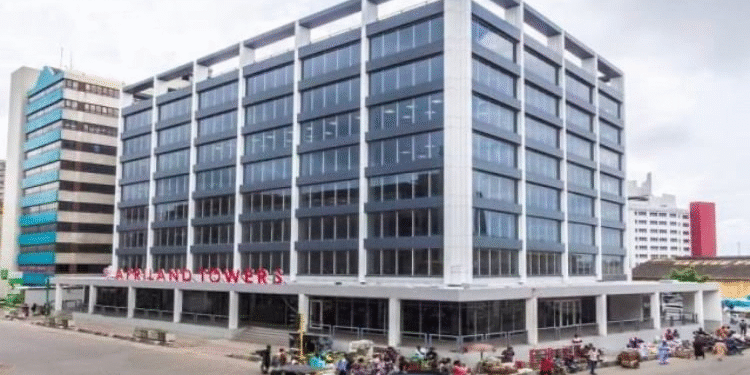Fresh revelations have emerged on the cause of deaths recorded in the recent fire at Afriland Tower on Lagos Island, with emergency officials confirming that toxic smoke from a burning lithium battery inverter system was responsible for most of the fatalities.
The inferno, which broke out on Tuesday at the high-rise commercial building in Marina, occurred on the same day another fire gutted Mandilas Market and adjoining plazas on Taiwo Street. The twin incidents left several people injured and destroyed goods worth millions of naira.
Videos circulated on social media showed trapped occupants of Afriland Tower struggling to escape as thick smoke poured from the windows. Some attempted to jump from upper floors, while others were rescued with ladders by residents and passersby. Though many were revived on the spot, others were rushed to hospitals for treatment.
Within 48 hours of the disaster, at least 10 people—staff of the Federal Inland Revenue Service (FIRS) and United Capital Plc—were confirmed dead at various hospitals after inhaling poisonous fumes. No bodies were recovered from the scene, contrary to initial fears.

Emergency responders disclosed that while the fire itself was quickly contained, the real danger came from smoke generated by the lithium inverter system. The fumes, laden with carbon monoxide and heavy metals, rapidly displaced oxygen in the building, leaving occupants unconscious within minutes.
A health official explained that victims suffered complications from the hazardous smoke, with some cases worsened by pre-existing medical conditions. “Those who inhaled heavy concentrations of the fumes could not be resuscitated,” the source said.
Experts have since warned of the grave dangers of lithium battery fires. Bankole Owolabi, a chemistry lecturer at Adekunle Ajasin University, noted that such explosions release toxic metals including cobalt, nickel, and manganese. “These fumes are not ordinary smoke; they are laced with heavy metals that can cause cancers and long-term health problems,” he explained.
Medical experts added that carbon monoxide in the smoke bonds more strongly with red blood cells than oxygen, leading to oxygen deprivation in vital organs such as the brain, heart, and lungs. Prolonged exposure can result in organ failure and death.
The Lagos State Fire and Rescue Service confirmed on Thursday that 10 people had died, while both FIRS and United Capital issued statements mourning their staff. Among the deceased were senior officials of FIRS and six employees of United Capital Plc.
In response, the Federal Fire Service announced a nationwide fire safety compliance audit to assess preparedness in both public and private buildings. Controller General Samuel Olumode said errant facilities would face sanctions, while staff and facility managers would undergo training to improve safety standards.
President Bola Tinubu and Lagos State Governor Babajide Sanwo-Olu have both condoled with families of the victims and institutions affected, describing the incident as painful and shocking.
The Afriland Tower tragedy has reignited concerns about safety standards in Lagos’ commercial hubs, where fire outbreaks linked to electrical faults, generators, and inverters are increasingly common. Authorities have pledged stricter enforcement of building safety codes, especially in older high-rise structures across the city.









